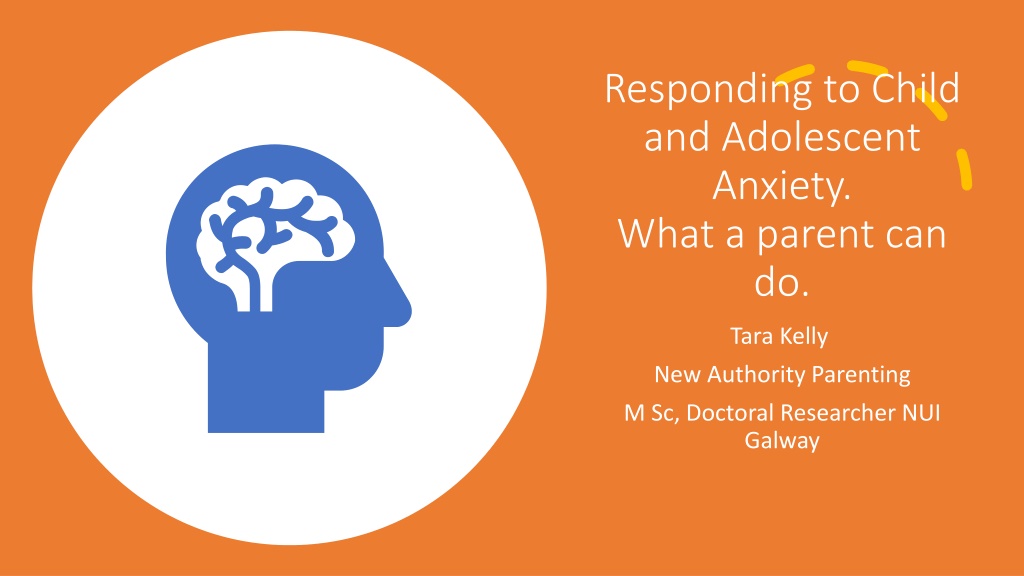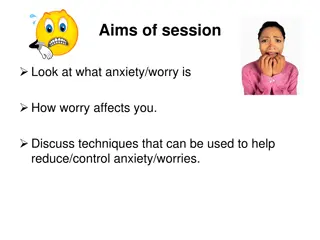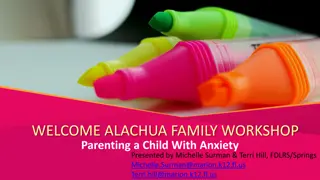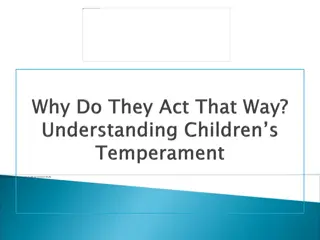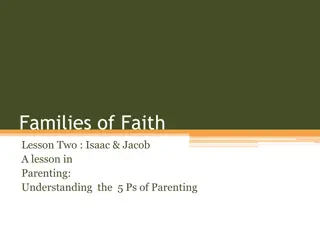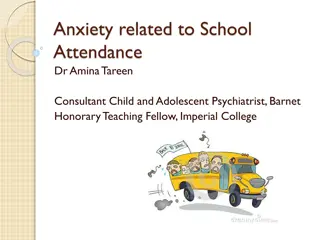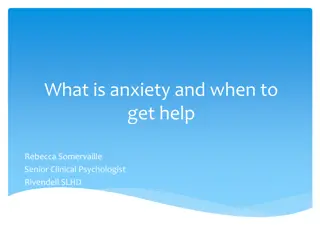Effective Strategies for Parenting Children with Anxiety
Explore how parents can support children dealing with anxiety by understanding its impact, avoiding common pitfalls, and transitioning from a protective to empowering approach. Learn about practical tips based on Supportive Parenting for Anxious Childhood Emotions (SPACE) framework.
Download Presentation

Please find below an Image/Link to download the presentation.
The content on the website is provided AS IS for your information and personal use only. It may not be sold, licensed, or shared on other websites without obtaining consent from the author. Download presentation by click this link. If you encounter any issues during the download, it is possible that the publisher has removed the file from their server.
E N D
Presentation Transcript
Responding to Child and Adolescent Anxiety. What a parent can do. Tara Kelly New Authority Parenting M Sc, Doctoral Researcher NUI Galway
A quick look at anxiety rates The impact of anxiety on families Common pitfalls for parents Family Accommodation Taking a new position in relation to the anxiety what you can do. Based on SPACE (Supportive Parenting for Anxious Childhood Emotions) (Lebowitz and Omer, 2013) Yale Centre for Childhood Anxiety Disorders What this session will cover
Most common mental health disorder for children and adolescents The most treatable of mental health problems for children A disorder or a problem? Jigsaw : 49% of adolescents report experiencing levels of anxiety that lie outside the normal range. (Dooley, 2019) Many parents seeking services and long waiting lists Anxiety
Parents can feel controlled by the child's anxiety Family plans can be significantly impacted Constant demands Exhausted Helpless and hopeless Impact of anxiety on families
Parents are not to blame for their child's anxiety Parents can become very involved with their child's anxiety Why parents? Parents can be part of the solution There are many pitfalls in managing a child with anxiety
Protecting Demanding
PROTECTING My child is vulnerable He needs to be protected She can't handle stress He needs a softer touch My job is to make her as comfortable as possible Common pitfalls DEMANDING He needs to toughen up There's nothing to be afraid of Why can't she be more like her sister He's just clingy and looking for attention
From protecting to demanding "She finds it too hard. She can t manage "There's no need to be afraid. All the kids can do it".
Family accommodation of childhood anxiety refers to the countless changes that parents and family members make to their own behaviours or actions due to childhood anxiety. Introducing accommodation Accommodation refers to the way parents urge to protect and reassure their child may reinforce the child s anxiety by hampering the development of their ability to regulate their own emotions.
Constant reassurance Speaking for your child Spending long periods of time with your child at bed-time Avoiding certain places Checking lights, switches Allowing your family to avoid social events, places, activities Think about how you might accommodate your child's anxiety?
Why parents accommodate Find it hard to see their child upset Easier just to do it! Worry about the child's reaction To keep the peace in the house Belief that your child cannot manage Almost 100% of parents accommodate. Some accommodations can be helpful.
Participation Parents become skillful at anticipating anxious responses, will begin preventing by taking advance action in their accommodating behaviours. Participation can also occur when parents participate in refraining from certain behaviours which may trigger the anxiety. Modification The organisation of family life and modifying family routines around the child s anxiety.
How much of your time is taken up by your child's anxiety? What are you doing differently for this child (compared to siblings)? What would you do differently if your child was not anxious? How do you accommodate? What is stopping you from making a change? Questions
What can we do? Acceptance Confidence Support
Prepare as much as possible (see links to book and talks) Choose an accommodation Expect the process to be challenging Inform your child Increase support for your child Prepare for difficult responses Making a plan
Sarah. You have been very worried about the electrics at nighttime. We can really see how hard this is for you and how scared you are that something might happen in the house. But we also know that you are strong and that you will be able to deal with the worry. We have been checking the electrics many times each night and now we realise that we are not helping you to overcome your fear. We have decided to make a change so that we can help you. We are not going to check the electrics every night but we will do the normal safe routine. We will not be answering questions but we will remind you of our plan just once. We know this change will be hard for you but we really believe you can deal with the worry. We love you so much and are determined to support you with this.
Stay supportive Remain anchored Avoid escalations Build on your relationship Success means not accommodating Success means child gets through the anxiety (not feels it less). Self-care is essential Where to from here?
https://www.youtube.com/watch?v=VUay eUlc_Gs&t=1587s https://www.youtube.com/watch?v=- 9bTiuCNzus https://www.youtube.com/watch?v=4SLW KgbWfug https://www.youtube.com/watch?v=76Rb LoNra_A&t=1619s https://www.kidsskills.org/
https://www.bookdepository.com/Breakin g-Free-Child-Anxiety-OCD-Eli-R- Lebowitz/9780190883522?ref=grid- view&qid=1647349847980&sr=1-1 https://www.bookdepository.com/Outsma rting-Worry-Dawn- Huebner/9781785927829?ref=grid- view&qid=1647349866248&sr=1-1 Books
